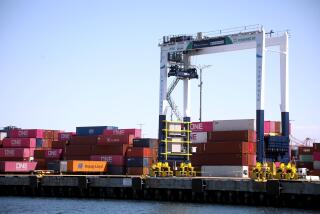Nuclear waste lacks final resting place
- Share via
CHICAGO — In a pool of water just a football field away from Lake Michigan, about 1,000 tons of highly radioactive fuel from the scuttled Zion Nuclear Power Station are waiting for someplace else to spend a few thousand years.
The wait just got longer. A lot longer.
President Obama’s proposed budget all but kills the Yucca Mountain project, the controversial Nevada site where the U.S. nuclear industry’s spent fuel rods were to spend eternity. There are no other plans in the works, so for now the waste will remain next to Zion and 103 other reactors scattered across the country.
Obama has said there are too many questions about whether storing waste at Yucca Mountain is safe. His decision fulfills a campaign promise, but it also renews nagging questions about what should be done with the radioactive waste steadily accumulating in 35 states.
During his confirmation hearings, Energy Secretary Steven Chu said the waste could safely remain at nuclear plants while another plan is worked out. Reversing course from previous administrations satisfies critics in Nevada, including Senate Majority Leader Harry Reid, but triggers another round of political maneuvering and regional bickering in Congress.
“We are drifting toward a permanent policy of keeping extremely toxic waste next to the Great Lakes, and that cannot stand,” said U.S. Rep. Mark Steven Kirk (R-Ill.), who echoed industry officials in calling for an independent panel of scientists and engineers to find a solution. Obama, too, is calling for more study.
More than 57,000 tons of spent fuel rods already are stored next to reactors, just a few yards from containment buildings where they once generated nuclear-heated steam to drive massive electrical turbines.
The lack of a permanent solution poses a serious challenge to the industry’s plans to build more than 30 new reactors. Existing nuclear plants produce 2,000 tons of the long-lived waste each year, most of which is moved into pools of chilled water that allow the spent -- but still highly lethal -- uranium-235 to slowly and safely decay. Uranium-235 has a half-life of nearly 704 million years -- meaning that half its atoms will decay in that time.
But containment pools never were intended to store all of the spent fuel that a reactor creates. The idea was that the cool water would stabilize the enriched uranium until it could be sent to a reprocessing plant or stored in a centralized location.
Instead, it keeps piling up. Although industry officials insist the waste is safely stored in fenced-off buildings lined with concrete and lead, there are concerns that a leak or a terrorist attack could create an environmental catastrophe. Many of the nation’s nuclear plants are close to highly populated areas or next to bodies of water.
As power companies run out of space in their containment pools, they increasingly are storing the waste above ground in concrete and metal casks.
“We continue to ask the federal government to provide a clear solution for what the long-term storage of spent fuel will be,” said Marshall Murphy, spokesman for Exelon Nuclear, the owner of all seven nuclear plants in Illinois.
Until now, the solution was Yucca Mountain, 90 miles northwest of Las Vegas, which Congress chose in the late 1980s as a permanent repository. Federal officials spent the last two decades -- and billions of dollars -- preparing to bury spent fuel in a series of fortified tunnels drilled into the mountain.
The Nuclear Regulatory Commission still plans to hold hearings about Yucca Mountain, but without further funding the project will be a very expensive hole in the ground.
The repository’s apparent demise is part science and part politics. Recent studies have shown that water flows through the mountain much faster than previously thought, which raises concerns that radioactive leaks could contaminate drinking water.
Industry critics say the government’s inability to come up with a permanent burial ground for highly radioactive waste is another reason the U.S. should wean itself from nuclear power.
“President Obama made the absolutely correct decision,” said Dave Kraft, director of the Nuclear Energy Information Service, an industry watchdog. “Unfortunately for the nation, it comes about 15 years and $10 billion too late.”
--
More to Read
Sign up for Essential California
The most important California stories and recommendations in your inbox every morning.
You may occasionally receive promotional content from the Los Angeles Times.













